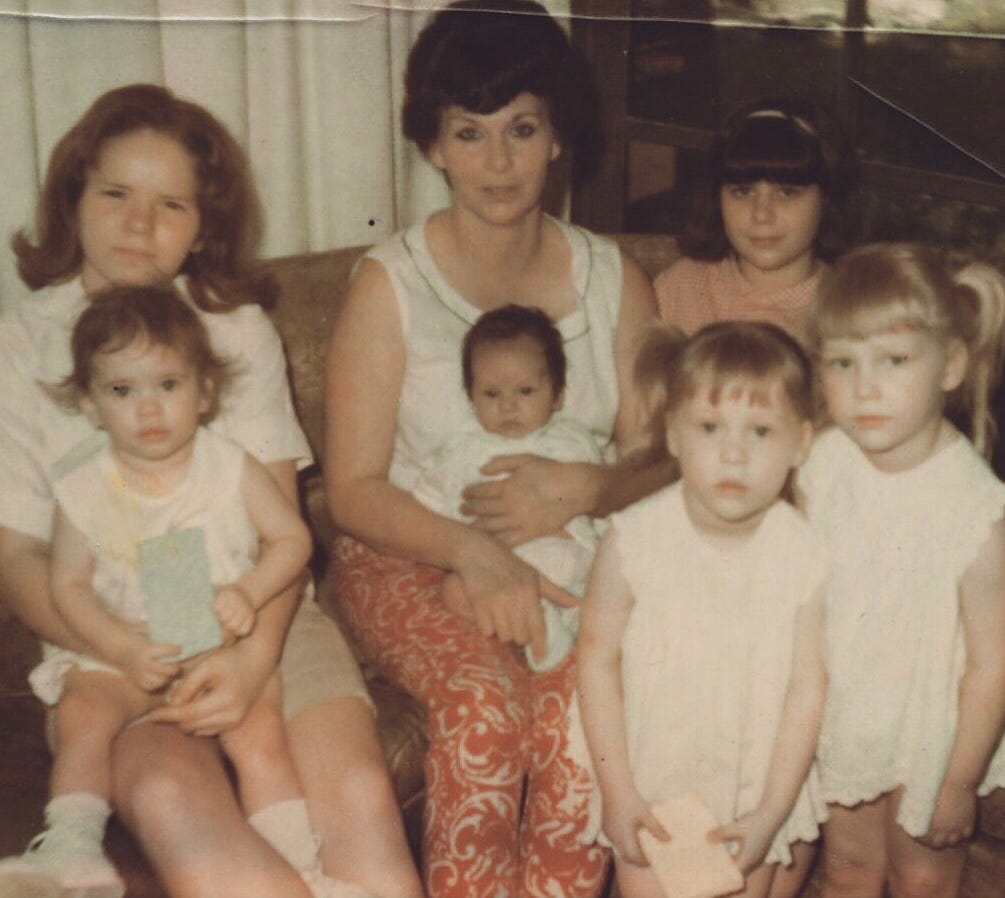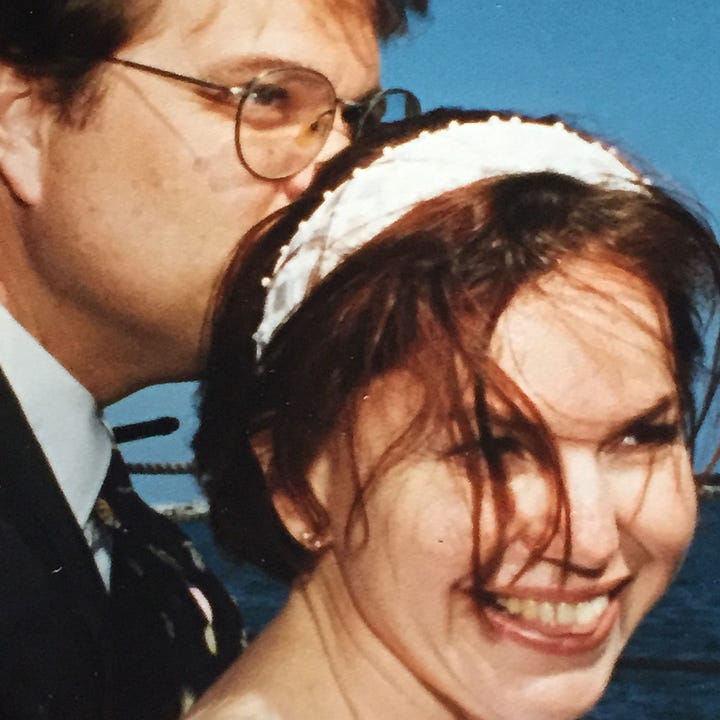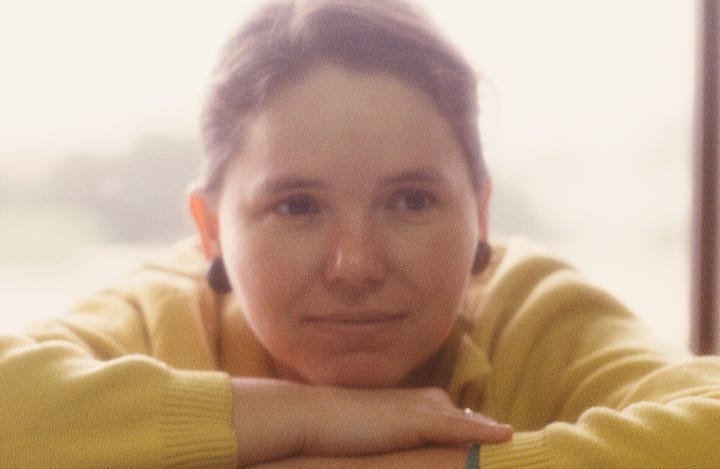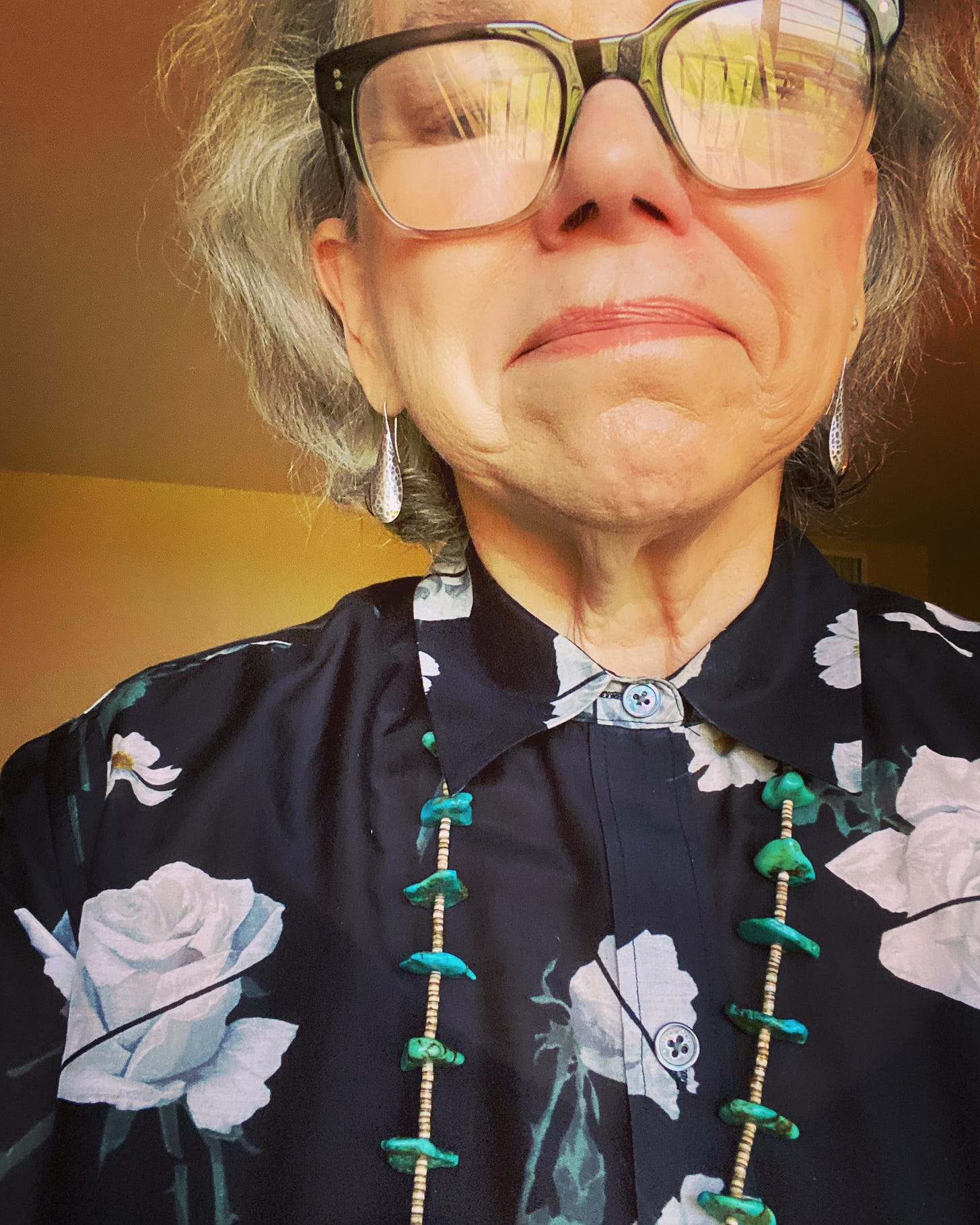This is 70: Chris J. Rice Responds to The Oldster Magazine Questionnaire
"For a long time, I believed what I’d been told by my angry mother. That there was something wrong with me. Now, I’ve lived long enough to know I am more than okay. I am marvelous."
From the time I was 10, I’ve been obsessed with what it means to grow older. I’m curious about what it means to others, of all ages, and so I invite them to take “The Oldster Magazine Questionnaire.”
Here, writer and artist responds. -Sari Botton

Chris J. Rice is a writer and visual artists who settled in Los Angeles after earning an MFA from California Institute of the Arts. She’s worked as a field hand, nurse’s aide, preschool teacher, newspaper researcher, corporate trends analyst, and public librarian. Her stories and essays have been selected as an editors’ pick in LONGREADS Top Five of the Week, nominated for a Pushcart Prize, and named a prizewinner in Hunger Mountain’s Creative Non-Fiction contest. Her work has appeared in [PANK] Online, The Rumpus, Catapult, Tasteful Rude, and Joyland Magazine, among other publications. She lives in Los Angeles with her husband and their dog, Beckett. Check out her newsletter, “Don’t Make Me Stop This Car!”
How old are you?
70
Is there another age you associate with yourself in your mind? If so, what is it? And why, do you think?
I often think of myself as half my age, eternally 35, the age I was when I moved to L.A. from Oklahoma to attend art school. Before that relocation I felt myself to be 8 years old. Utterly bereft. Frightened awake in the night by a knife fight across the end of my twin bed. A fight which blew my family apart and set my mother and her children rambling.
Do you feel old for your age? Young for your age? Just right? Are you in step with your peers?
I felt old when my ex-husband died a few years back. I feel young when I’m deep in conversation with anyone, even a stranger. Connections keep me young. And open to the world. I have never felt myself to be in step with any particular crowd, as a friend of mine calls social groups. I make a point of responding to people who interest me, no matter their age. I learned to do that at 18. Newly transitioned out of foster care, I got a job on the non-ambulatory wing of an Oklahoma nursing home taking care of elderly women. One day I looked over the shoulder of 86-year-old Mrs. Tillie Anthony as she wrote in her notebook and read this line: “They think I can’t hear what they say.” I think of her when I have lunch with my 90-year-old friend, Dorothy, or meet a woman half my age for coffee. Tillie taught me to simply listen to another person’s experience, their needs and hopes and fears. To never presume to know who my peer is.
At 18, newly transitioned out of foster care, I got a job on the non-ambulatory wing of an Oklahoma nursing home taking care of elderly women. One day I looked over the shoulder of 86-year-old Mrs. Tillie Anthony as she wrote in her notebook and read this line: “They think I can’t hear what they say.”
What do you like about being your age?
I like having more time to explore. I like the perspective which is possible at my age. I like not caring so much what other people think of me. It makes me braver on the page. I like wearing mixed prints and fancy clothing in the daytime. I like that no matter the weather I enjoy a brisk walk outdoors. I like that I seldom need a recipe for anything. I can cook by heart.
What is difficult about being your age?
Life is tenuous and fragile. The future unknown. On the road with my mother when I was a child, not knowing where we’d be living next was difficult, and in some ways, oddly enough, that harrowing experience prepared me to face the ultimate homelessness. Which is death. In a few months I will be 71 years old. My mother and one of her sisters, and their mother, my maternal grandmother, all died at 71. The closer I get to that age the more I think about dying. Facing the loss of my beloved, my consciousness, contemplating the loss of the home my husband and I have made is difficult. The composer John Cage in his Lecture on Nothing writes: “We carry our homes within us, which enables us to fly or to stay—to enjoy each.” I’ve carried that line with me through many difficult times, and it helps. It helps to roll into a ladybug ball on the couch and call the snug comfort of my own body home.
What is surprising about being your age, or different from what you expected, based on what you were told?
It’s surprising how philosophical I have become in the last twenty years. Instead of thinking less, I think more, read more, write more. In a wider ranging and experimental way. I have not become more conservative as marketers and political pollsters would have us believe about seniors. No. In my particular old age, I have become more liberal, and equalitarian, broader minded, untraditional. Radical. At last, fully free to be the child I once was in the backseat of the car staring out the window trying to imagine the lives of all the people we passed.
What has aging given you? Taken away from you?
Age has taken away my fear of being permanently broken and harmed by the past. For a long time, I believed what I’d been told by my angry mother. That there was something wrong with me. Now, I’ve lived long enough to know I am more than okay. I am marvelous.

How has getting older affected your sense of yourself, or your identity?
I’d never felt as if I belonged anywhere. I jumped off my family tree. There was no other way. The tree was falling. I thought I’d left everything behind. That I was self-made. Then I hit 60 and wanted to know more about where I came from and what had happened to me, to my family of origin. So much loss. I’m a professional researcher. A trained librarian. So, I used those skills to try and uncover what had happened.
I learned I was descended from those who walked the Trail of Tears, (The Cherokee call the event, Dee-ge-jee-yee-iv-sta-nv or when they were driven). More than one of my maternal ancestors had been relocated from their homeland in what is now Alabama and Georgia. My research helped me to better understand my maternal grandmother and my mother. Connecting to them inspired deeply imagined ancestor stories. Which my own story clearly belongs within.
What are some age-related milestones you are looking forward to? Or ones you “missed,” and might try to reach later, off-schedule, according to our culture and its expectations?
I have yet to publish a book.
What has been your favorite age so far, and why? Would you go back to this age if you could?
I enjoyed being 45. It’s the year I married my husband, Greg. But I wouldn’t go back to this age or any age. I want to move forward. Always.
In a few months I will be 71 years old. My mother and one of her sisters, and their mother, my maternal grandmother, all died at 71. The closer I get to that age the more I think about dying.
Is there someone who is older than you, who makes growing older inspiring to you? Who is your aging idol and why?
I admired my neighborhood friend, June Brown, an elderly woman who lived four blocks over. She was a fellow night owl who I’d met while walking our first dog Keesha. I rounded the corner of Herbert onto Albright Avenue and there she stood in front of her own dingbat house, watching her own dog run the length of the street and back, confident he would return. I stopped to say hello and the first thing she said was: “I don’t know why I’m still alive.” Predeceased by both her son and daughter, now she only had her dog to care for. Neighborhood June was 82 years old when I met her, old enough to be my mother. But she was nothing like my mother. “Whatever you want, do it or not,” Neighborhood June would tell me. “You choose.”
The year I met her I’d joined the writer John Rechy’s professional writing group in the Hollywood Hills. It was two years since my mother died and I was 53 years old, and terrified for anyone to read what I had written. I still felt responsible for the abuse I had suffered with my mother. The truly magical way out of this falsity is ultimately, of course, forgiveness. Forgiveness is a story we tell ourselves to ease the pain. But that wasn’t Rechy’s way. “Make it fascinating,” John said. “Add details to deepen the mystery.” But. Most of all keep it fascinating. “Despicable, awful, frightening, wicked—but fascinating. That’s the key: Write about characters, good or evil, who fascinate.” June Brown, who died in 2007, and John Rechy who at 92 is working on another book, are my aging idols for their encouragement and their refreshing resistance to old ideas.


What aging-related adjustments have you recently made, style-wise, beauty-wise, health-wise?
In my 60s I began to wear comfortable shoes. All-birds. Birkenstocks and Ugg boots. No more kitten heels or flimsy flip-flops. I went into the opposite direction with undergarments. No more underwires. Or a crushing body slimmer. Now I’m all about comfort. Nerdy comfort is how I describe my style. Keeps me steady on my feet and breathing deeply. At night I sleep deeply with the aid of a C-Pap machine. At 60 I was diagnosed with sleep apnea. Then Strabismus. The result of having been hit in the head as a kid. After two surgeries I regained peripheral and three-D vision, which until then I didn’t even know I had lost.
I have not become more conservative as marketers and political pollsters would have us believe about seniors. No. In my particular old age, I have become more liberal, and equalitarian, broader minded, untraditional. Radical. At last, fully free to be the child I once was in the backseat of the car staring out the window trying to imagine the lives of all the people we passed.
What’s an aging-related adjustment you refuse to make, and why?
I refuse to don cheery bright clothing, to hang my reading glasses on a chain around my neck, or to wear any article of clothing called a romper.
What’s your philosophy on celebrating birthdays as an adult? How do you celebrate yours?
When I turned 60 a dear friend threw me a big party. Even my foster mother came. It seemed fitting and lovely to celebrate the fact that I’d made it that far. Ten years later I’m content to have dinner with my husband at a favorite spot nearby and talk by phone with loved ones who live at a distance. To celebrate relationship, that’s what seems important to me now.






This was one of the most meaningful questionnaire responses I have read. No pat answers, honest and insightful, neither optimistic or pessimistic. Just real.
I'm so happy for this woman, that she has found out so much about who she is, and about what she needs to feel content. I'm the same age and it gives me hope.